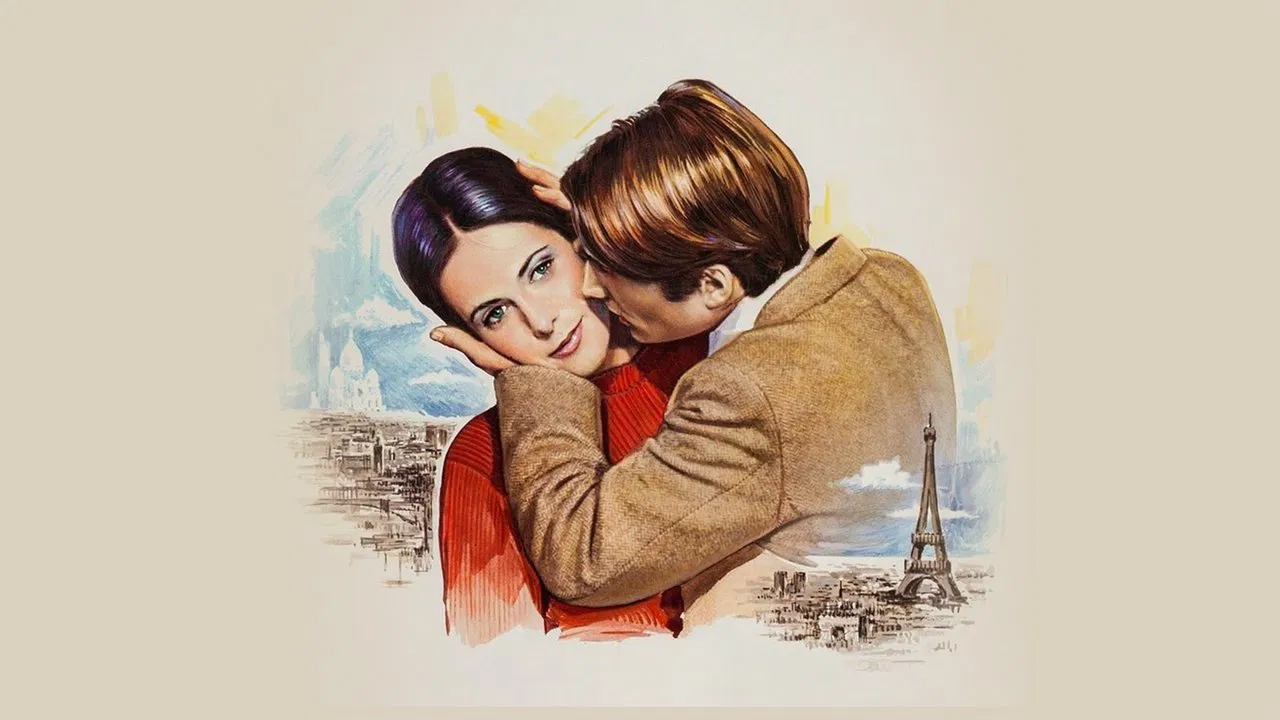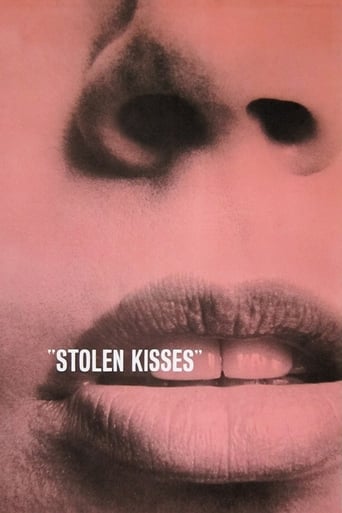

brilliant actors, brilliant editing
... View MoreI really wanted to like this movie. I feel terribly cynical trashing it, and that's why I'm giving it a middling 5. Actually, I'm giving it a 5 because there were some superb performances.
... View MoreThis is a must-see and one of the best documentaries - and films - of this year.
... View MoreIt's a good bad... and worth a popcorn matinée. While it's easy to lament what could have been...
... View MoreFrançois Truffaut continues the story of Antoine Doinel, the alter ego of Jean-Pierre Léaud, 9 years after the groundbreaking THE 400 BLOWS (1959), the rebellious boy has reached the adolescence, still rebellious though, he is discharged from his military service for being unruly, the comic vibe is established from the very start by the juxtaposition of the dead-serious officer and a laughter-repressed Antoine, who turns out to be a street-smart young man in spite of a tough childhood, and his parents have been completely evacuated out of his life (without any explanation). The first place he visits is a whorehouse, then stops by his girlfriend Christine Darbon (Jade), but is told she is out on a ski vacation by her genial parents (Ceccaldi and Duhamel), but Truffaut slyly implies that there seems to be something else on Christine's agenda now.Antoine finds a job as a night porter in a hotel in Paris, thanks to Christine's father's recommendation, a comely Christine visits him one night, she greets him on the new job and seems casually happy but not so enthusiastic. Soon he is fired for being an unwitting helper of a private detective Henri (Harry-Max), who instead introduces him to the new exciting line of business managed by Monsieur Blady (Falcon). Antoine starts his new vocation with great passion although his stalking skill is a far cry from professional. Truffaut's perspicacious insight of urban savvy is brought to the fore in this segment, mainly surrounding two cases, a subtle love triangle about a (closeted) man looking for his magician lover and a more detailed inside-job, where Antoine is assigned to undercover in a shoe shop owned by Georges Tabard (Lonsdale, a great scene-stealer), who wants the agency to find out why he is so disliked by everyone around him, but the irony is that during Georges' loquacious introduction of his background, the reason behind that is pretty crystal-clear. During the course, Antoine is hopelessly having a crush with Georges' wife Fabienne (Seyrig, enigmatic and fabulously seductive), the apotheosis of a woman's sheer perfection. He is torn between his unquenchable fascination to Fabienne and the on-and-off relationship with Christine, which extracts the most vehement outburst in the mirror scenes where Antoine's unfitting characteristic is pungently reflected, with the iterations of self-persuasion and self-boost, to no avail. Eventually after tasting the temptation, which costs him the second job, he reconciles with Christine in the cutesy chapter where he works as a TV repairman, but the uncertainty of his own feelings becomes more pronounced in the coda, where a stalker makes a wanton confession to Christine in the presence of Antoine, both dismiss at him on the spot, but think twice, it is the capriciousness of love and emotions that will certainly puzzle Antoine, and trigger every viewer, to discover what will happen to him and Christine later, aka. in BED & BOARD (1970), approximately after a two-years spell.STOLEN KISSES is charming in its carefree tempo and disarming in its frankness about whimsical triviality, it is not a major or challenging piece of work from Truffaut, but still scintillates with the profundity of a intelligent life-observer, an obliging humorist and an inspiring filmmaker.
... View MoreAfter a stint in the army, Antoine Doinel is released from active duty because of insubordination and ineptitude. The releasing officer does not have kind words for the soon to be civilian young man. As he comes out from the place, he does not take long to find his way to have sex with a prostitute and to reclaim his humble abode in a run down apartment.Antoine is lucky in getting a position at a hotel thanks to the parents of Christine, his on and off girlfriend. It is obvious Antoine is not fit for the position as he bungles a situation where a cheating wife is surprised with her lover in a room where the reception clerk is duped by the older P.I. behind the case. The older detective feels bad for having caused Antoine's the loss of his job and recommends him to apply for a job with his agency.The detective agency proves to be no different from Antoine's previous experiences. His best success in a case is when his superior asks him to infiltrate the shoe store owned by M. Tabard, who feels his employees simply hate him and wants to find out what is he doing wrong. No one is happier to meet Antoine than Fabienne Tabard, the stylish wife of the owner; she sees in Antoine a man she can seduce and who will appreciate her charms. "Stolen Kisses" is a continuation on Francois Truffaut's take on the character that first was examined in his "400 Blows". It is a picaresque comedy because the way Antoine sees the world around him, a society where he does not fit snugly. Mr. Truffaut made a few films around his Antoine Doinel and this one, even 44 years after it was released, still is enjoyable to watch. It is light in tone as the inept young hero of the story goes from one occupation to the next without not knowing where his future will take him. His girlfriend Christine Darbon, is an afterthought in the narrative, although by the end Antoine gets serious about getting more involved, and in a way, settled with the lovely young lady.It would have been inconceivable to think anyone else but Jean-Pierre Leaud, the original Antoine of a few years before, not playing him again. Mr. Leaud had a good working with Mr. Truffaut as they collaborated on different projects together. Best thing in the film is the elegant Delphine Seyrig, playing Fabienne Tabbard, a sophisticated seductress that captures Antoine's vivid imagination. Claude Jade appears as the sweet Christine, the woman Antoine desires. Michael Lonsdale is also perfect as M. Tabard, the shoe store owner. "Stolen Kisses" remains among Francois Truffaut most best comedies, which seen today, evokes a bygone era and the atmosphere of a bygone period in Paris, which was lovingly photographed by Denys Clerval, with a musical score by Antoine Duhanel.
... View MoreStolen Kisses is a film unlike any other, perhaps because it combines so many elements into such a breezy film experience. Though Francois Truffaut broke into the film industry with his debut The 400 Blows depicting the young, misplaced Antoine Doinel as a youth attempting to find his way amidst the chaos of Paris, Stolen Kisses might be a more mature and understanding film to its protagonist. Like Antoine, Truffaut has grown up.This adventure follows Antoine's departure from the army and his attempt to find steady work in Paris, that gorgeous and timeless city with the ethereal Sacre Coeur looming in the background. He goes through a number of professions, all of which are completely captivating in their interest to us the audience and Antoine himself. Tying all this together is his constant affection for the girl he left for the army, Christine, who very well may hold the key to his heart. What is so endlessly fascinating about this film is the stark simplicity Truffaut films it in. Like his previous work, this film has remarkable fluid camera movements as he gives us a breathtaking view of the eternal city and the journey Antoine is on in hopes of discovering his place. We are dropped into various situations such as a small hotel, a private detective agency and a TV repair truck, all of which are Antoine's attempts to find stability in a most unstable of times: Paris, 1968. What must be said about this remarkable film is that it is at its core a most personal story. Clearly, Antoine represented Truffaut in The 400 Blows and he does here. From adolescence to teen angst to young adulthood, Truffaut has shown us in three examples an everyman many of us can relate to. He is self-conscious, anxious, awkward around women yet tries to do the best he can. In Truffaut's eyes, and ours, this is the source of his innocence and charm.
... View MoreAs soon as "Stolen Kisses" begins, it makes a claim to being one of the most charming movies of all time. There's a lilting French jazz song on the soundtrack and a shot of the Eiffel Tower against a blue skya perfect introduction to this comedy about the crazy things people do for love. It's a gentle, loosely structured movie, sometimes farcical and always sweet-natured.Main character Antoine Doinel (Jean-Pierre Léaud, of course) is now in his early twenties and has a job at a private detective agency whose clients tend to be jealous or broken-hearted lovers. His own love life isn't in much better shape, though: he has an on-and-off relationship with a cute violin student named Christine (Claude Jade), but with many distractions along the way. The most important is Fabienne Tabard (Delphine Seyrig), the beautiful, elegant wife of a shoe-store owner (played by a very droll Michel Lonsdale) who has hired the detective agency to investigate why nobody loves him.Though the tone of this movie is very different from that of its excellent predecessor "The 400 Blows," that's not a bad thing. It's nice to know that Antoine can make a generally respectable life for himself, rather than becoming embittered or hardened from his experiences as a juvenile delinquent. He's acquired a sense of humor that helps him get through tough situationshe doesn't get angry when the army gives him a dishonorable discharge, he grins! But enough traces of the old "400 Blows" Antoine remain to let us know it's the same character: the haplessness, the intensity, the love of Balzac. Léaud's performance is extremely winning--how nice that the child actor has turned into a leading man with a talent for comedy.The ending of "Stolen Kisses" is a little abrupt and undermotivated: we never learn why Christine decides she wants Antoine back, nor why Antoine realizes that Christine is "the one." But these kind of quibbles seem mean-spiritedreally, could this charming romance end any other way than with the two lovers strolling through a park, accompanied by that same nostalgic jazz song?
... View More